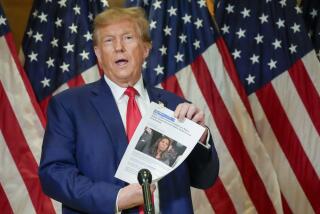U.S. to Pay Attorneys Millions for Defending Noriega : Law: The former Panamanian leader’s assets are frozen. Statutes permit high fees in ‘complex’ situations such as his drug- smuggling charges.
- Share via
MIAMI — Manuel A. Noriega’s defense attorneys will be paid millions in public funds to defend the deposed Panamanian strongman because his estimated $20 million in personal assets remains frozen in foreign bank accounts, the government determined Monday.
Noriega’s four defense attorneys are likely to be awarded fees of several hundred dollars an hour each, with the total bill expected to run into the millions. The defense has already incurred $1 million in expenses, including investigators, translators, computer specialists and paralegals, a defense attorney said.
The unusual payment plan, which some lawyers said they believed was unique, was approved by U.S. District Judge William M. Hoeveler after Noriega’s lawyers complained that he has been unable to pay them since last January. The payments will be retroactive, and will also include expenses.
Under the solution agreed to by U.S. Atty. Dexter Lehtinen and Frank A. Rubino, Noriega’s lead counsel, the former Panamanian leader will sign a binding affidavit certifying that if he wins his U.S. trial next year he will reimburse the government for whatever funds have been advanced to his lawyers.
If Noriega should be convicted on 11 counts of drug-smuggling, he faces a lifetime in prison, millions of dollars in fines and forfeiture of any remaining assets.
Lehtinen, speaking on behalf of the government, told Hoeveler that the payment plan is permitted under terms of the federal Criminal Justice Act which assures legal representation for needy defendants.
In most cases involving an indigent defendant, the court appoints an attorney who receives anywhere from $20 to $60 an hour in public funds. But Noriega has indicated he does not want a court-appointed lawyer, which would cost him nothing, and instead wants to keep Rubino and his associates.
Noriega, who the government claims is extraordinarily wealthy from illicit drug deals, hired Rubino and several other attorneys after his February, 1988, federal indictment but before his surrender to the U.S. military invasion force early last January.
Lehtinen said the federal act specifies that in “exceedingly complex” cases such as this one, the government may award higher-than-usual fees and expenses. Hoeveler will hear testimony soon on how high the fees should be.
Lehtinen proposed the unusual solution because, he said, the Justice Department does not have authority to “unfreeze” bank accounts which are in foreign countries and have been put on hold by those governments at the request of the United States. The accounts contain more than $20 million, including $10 million in the United Kingdom, authorities have said.
Rubino previously argued that the freezing of Noriega’s assets was unfair and illegal because the assets included about $11 million Noriega had received over the years from the United States and $7 million from other governments for providing them with intelligence.
Diane Cossin, a spokesman for Lehtinen, said the United States acknowledges having made some payments to Noriega for intelligence purposes, which others have described as drug-related. But she said $11 million was too high an estimate.
Lehtinen submitted details in writing to the court, but his filing was placed under seal by Judge Hoeveler.
Noriega remains imprisoned in a federal facility south of Miami pending his trial, which is scheduled for next Jan. 28.
More to Read
Sign up for Essential California
The most important California stories and recommendations in your inbox every morning.
You may occasionally receive promotional content from the Los Angeles Times.













